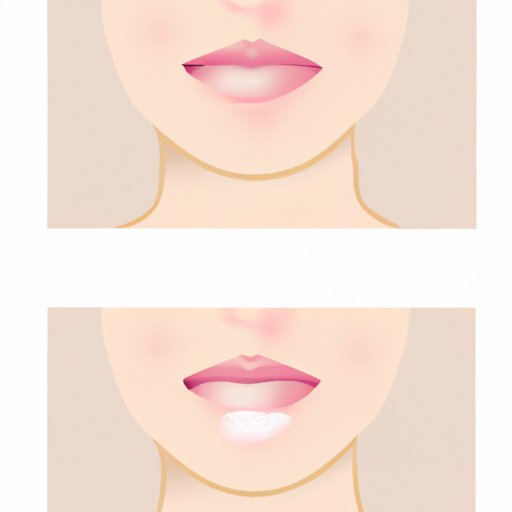Introduction
Peeling lips may seem like a minor issue, but it can have a significant impact on a person’s daily life. Whether it’s the discomfort, the embarrassment, or the uncertainty of what’s causing it, peeling lips can be hard to ignore. That’s why it’s important to understand the causes and remedies for this common problem. In this article, we’ll explore the common causes of peeling lips, remedies to try at home, lifestyle changes you can make to prevent peeling lips, and when to seek professional help.
Causes of Peeling Lips
There are several common causes of peeling lips. These include:
- Dry weather: Living in a dry climate or during winter when the air is dry can cause lips to become chapped and peel.
- Dehydration: When the body is dehydrated, it can affect the hydration levels of the skin and lips, leading to dryness and peeling.
- Allergies: Some people may develop peeling lips as a result of an allergic reaction to lip products, such as lipsticks or balms.
- Medical conditions: Certain medical conditions, such as eczema or psoriasis, can cause peeling, redness, and scaling of the lips.
Identifying the root cause of peeling lips is essential for effective treatment. It’s often helpful to keep a diary of when the peeling occurs, noting any potential triggers or factors that may be contributing to the problem.
Remedies for Peeling Lips
There are various remedies that may help prevent or treat peeling lips. Some options include:
- Lip balms: Using a lip balm that contains emollients, such as beeswax or petrolatum, can help soothe and moisturize dry lips.
- Exfoliating scrubs: Exfoliating the lips with a gentle scrub made from sugar and coconut oil can help remove dead skin cells and improve lip texture.
- Hydration tips: Drinking enough water, using a humidifier at home, and avoiding licking the lips can help prevent dehydration and dryness.
Certain remedies may be more suitable for specific causes of peeling lips. For example, lip balms may be most effective for dry weather-related peeling, while exfoliating scrubs may be better suited to help with dehydration-related peeling.
It’s important to note that some remedies may have potential side effects or risks associated with them. For instance, overuse of lip scrubs may cause irritation or damage to the delicate skin on the lips. It’s also important to use lip products that are free of potential irritants or allergens if you have sensitive skin.
Lifestyle Changes to Prevent Peeling Lips
Incorporating some lifestyle changes can help prevent peeling lips from occurring in the first place. Some tips to consider include:
- Drinking enough water: Aim to drink at least 8 glasses of water per day to help keep the body hydrated.
- Avoiding smoking and irritants: Smoking can damage skin and lips and irritants, such as spicy foods, can cause lip irritation and peeling.
- Achieving a balanced diet: Eating a healthy, balanced diet rich in vitamins and minerals can help support overall skin and lip health.
By incorporating these tips into your daily routine, you can help promote healthy, hydrated lips and prevent peeling.
The Science Behind Peeling Lips
There are several biological and physiological reasons why lips tend to peel so easily. For one, lips do not have sweat glands, which means they aren’t able to generate natural oils to keep them moisturized. In addition, they have a thin outer layer of skin and lack melanin, which is a pigment that helps protect skin from the sun’s harmful rays.
These factors can make lips more susceptible to dryness and damage, leading to peeling and discomfort. Understanding the science behind these factors can help guide effective treatments and prevention strategies.
When to See a Doctor
While peeling lips are usually harmless and can be treated with at-home remedies, there are times when it’s important to seek professional help. For example, if your lips are peeling along with other symptoms, such as fever or swollen glands, it may indicate an underlying condition. Additionally, if at-home remedies aren’t helping or if the peeling is severe or recurrent, it’s a good idea to see a doctor or dermatologist.
Your doctor may perform tests or examinations to rule out any underlying medical conditions, such as a fungal infection or autoimmune disorder, or prescribe medication or specialized treatments to help control symptoms.
Conclusion
Peeling lips can be uncomfortable and bothersome, but with some simple remedies and prevention strategies, they can be effectively treated and managed. By identifying the root cause of the peeling, using suitable remedies, and incorporating lifestyle changes, you can help prevent peeling lips and promote overall lip health. If you’re unsure about how to treat or manage your peeling lips, don’t hesitate to seek professional advice.
